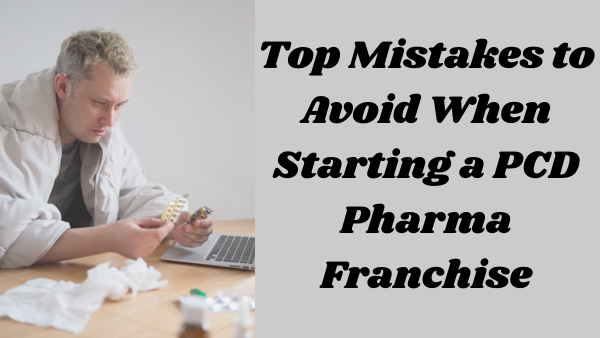
Top Mistakes to Avoid When Starting a PCD Pharma Franchise
1. Choosing the Wrong Pharma Company
❌ Mistake:
Partnering with a company without checking its background, product quality, or market reputation.
✅ Why It Matters:
The success of your franchise heavily depends on the credibility and product quality of the parent company. A bad choice can lead to poor product availability, ineffective marketing support, and dissatisfied customers.
✅ What to Do:
-
Research the company’s track record, certifications (like WHO-GMP), and customer reviews.
-
Ensure they offer quality assurance, timely delivery, and supportive terms.
-
Ask for product samples to evaluate quality firsthand.
2. Ignoring Monopoly Rights and Territory Clarity
❌ Mistake:
Not getting a clear agreement about exclusive rights in your selected territory.
✅ Why It Matters:
Without clear monopoly rights, you may face internal competition from other franchisees of the same company in your area.
✅ What to Do:
-
Insist on a written agreement that clearly defines your territory.
-
Understand whether you’ll have exclusive selling rights in that region.
-
Avoid companies that do not offer well-defined territory protection.
3. Overlooking Product Range and Demand
❌ Mistake:
Starting with a limited or irrelevant product portfolio that doesn’t match local demand.
✅ Why It Matters:
A narrow or poorly chosen product range can limit your sales. Not every medicine works in every region — you need products that match local market needs.
✅ What to Do:
-
Study the local market to understand which medicines or segments are in high demand (e.g., antibiotics, pediatrics, derma, cardiac-diabetic, etc.).
-
Choose a company that offers a diverse, high-demand product portfolio.
-
Consider including OTC products, supplements, and specialty ranges like gynecology or ayurvedic if relevant to your area.
4. Neglecting Legal Formalities
❌ Mistake:
Starting operations without proper licenses or documentation.
✅ Why It Matters:
The pharmaceutical business is highly regulated. Operating without the necessary legal documents can lead to penalties, fines, or business closure.
✅ What to Do:
Ensure you have:
-
Drug License (DL)
-
GST registration
-
FSSAI license (if dealing with nutraceuticals)
-
Agreement with the pharma company
It’s always advisable to consult a legal expert or someone experienced in pharma licensing.
5. Inadequate Marketing and Promotion
❌ Mistake:
Relying solely on the parent company for marketing, or not investing in promotional materials.
✅ Why It Matters:
Even if the pharma company provides some marketing tools, you still need to promote your business locally to grow. Without marketing, it's hard to attract doctors, chemists, or hospitals.
✅ What to Do:
-
Invest in visual aids, visiting cards, MR bags, sample kits, etc.
-
Build a local network of doctors, medical stores, and clinics.
-
Use digital marketing (social media, Google My Business) for local visibility.
6. Not Understanding the Target Market
❌ Mistake:
Trying to sell everything to everyone without knowing your ideal customer or region-specific demands.
✅ Why It Matters:
You need to understand who your customers are — general physicians, specialists, chemists, or hospitals. Without targeting the right people, your marketing efforts will be wasted.
✅ What to Do:
-
Identify your target audience and focus on their needs.
-
Customize your product selection and marketing approach accordingly.
-
Start with a focused region before expanding.
7. Lack of Financial Planning
❌ Mistake:
Underestimating the initial investment and working capital needed for inventory, marketing, and daily operations.
✅ Why It Matters:
Many startups run into cash flow problems within a few months due to poor planning. You’ll need funds not only for stock but also for transport, marketing, storage, and employee salaries if any.
✅ What to Do:
-
Prepare a realistic budget covering at least 6 months of operations.
-
Avoid overstocking in the beginning.
-
Reinvest profits wisely to scale your business gradually.
8. Poor Relationship Building with Doctors & Retailers
❌ Mistake:
Not investing time in building relationships with local doctors, pharmacists, and healthcare professionals.
✅ Why It Matters:
In the PCD pharma business, your network is your net worth. Regular prescriptions from doctors and sales from retailers are your primary revenue source.
✅ What to Do:
-
Make regular visits to doctors and pharmacies.
-
Offer samples, information, and support.
-
Maintain a professional relationship and build trust through consistency and service.
9. Ignoring Customer Feedback and Market Trends
❌ Mistake:
Not listening to your customers or ignoring what the market is asking for.
✅ Why It Matters:
Customer feedback helps you improve your service, choose better products, and stay ahead of competitors. The pharma market is dynamic, and trends change quickly.
✅ What to Do:
-
Stay updated with market trends (e.g., rise in demand for diabetic, cardiac, or herbal products).
-
Ask your clients (doctors, chemists) about product performance and preferences.
-
Be flexible and ready to adapt your offerings.
10. Not Reviewing Terms & Conditions Thoroughly
❌ Mistake:
Signing agreements or placing orders without reading the terms & conditions of the pharma company.
✅ Why It Matters:
Hidden clauses or unfair policies can hurt you later — whether it’s pricing, payment terms, product returns, or delivery issues.
✅ What to Do:
-
Read the franchise agreement carefully.
-
Clarify terms regarding payment, credit period, product availability, and return policies.
-
Choose companies that offer transparent communication and flexible policies.
Conclusion
Starting a PCD Pharma Franchise can be a highly rewarding venture — but only if you take the right steps and avoid common mistakes. By choosing a reputed company, understanding the market, securing legal licenses, and investing in smart marketing, you can build a profitable and sustainable pharma business.
Mistakes in the initial phase can cost you time, money, and reputation. So take your time, plan strategically, and start your franchise journey on the right foot.

